
The Group of Eight (G8) was an inter-governmental political forum from 1997 until 2014. It had formed from incorporating Russia into the Group of Seven, or G7, and returned to its previous name after Russia was expelled in 2014.

A great power is a sovereign state that is recognized as having the ability and expertise to exert its influence on a global scale. Great powers characteristically possess military and economic strength, as well as diplomatic and soft power influence, which may cause middle or small powers to consider the great powers' opinions before taking actions of their own. International relations theorists have posited that great power status can be characterized into power capabilities, spatial aspects, and status dimensions.
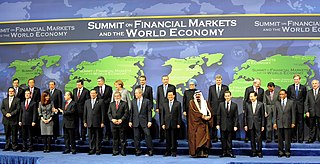
In international relations, a middle power is a sovereign state that is not a great power nor a superpower, but still has large or moderate influence and international recognition.

In international relations, since the late 20th century, the term "regional power" has been used for a sovereign state that exercises significant power within a given geographical region. States that wield unrivaled power and influence within a region of the world possess regional hegemony.
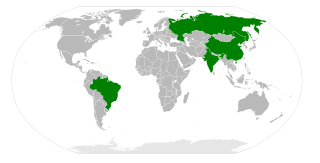
BRIC is a grouping acronym referring to the developing countries of Brazil, Russia, India, and China, which are identified as rising economic powers. It is typically rendered as "the BRIC," "the BRIC countries," "the BRIC economies," or alternatively as the "Big Four." The name has since been changed to BRICS after the addition of South Africa in 2010.

The G4 nations, comprising Brazil, Germany, India, and Japan, are four countries which support each other's bids for permanent seats on the United Nations Security Council. Unlike the G7, where the common denominator is the economy and long-term political motives, the G4's primary aim is the permanent member seats on the Security Council. Each of these four countries have figured among the elected non-permanent members of the council since the UN's establishment. Their economic and political influence has grown significantly in the last decades, reaching a scope comparable to the permanent members (P5). However, the G4's bids are often opposed by the Uniting for Consensus movement, and particularly their economic competitors or political rivals.

The G20 or Group of Twenty is an intergovernmental forum comprising 19 countries and the European Union (EU). It works to address major issues related to the global economy, such as international financial stability, climate change mitigation, and sustainable development.

The Group of Five (G5) encompasses five nations which have joined together for an active role in the rapidly evolving international order. Individually and as a group, the G5 nations work to promote dialogue and understanding between developing and developed countries. The G5 seek to find common solutions to global challenges. In the 21st century, the G5 were understood to be the five largest emerging economies

Reform of the United Nations Security Council (UNSC) encompasses five key issues: categories of membership, the question of the veto held by the five permanent members, regional representation, the size of an enlarged Council and its working methods, and the Security Council-General Assembly relationship. The Member States, regional groups and other Member State interest groupings developed different positions and proposals on how to move forward on this contested issue.
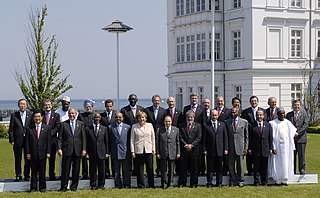
The 33rd G8 summit was held at Kempinski Grand Hotel, 6–8 June 2007. The summit took place in Heiligendamm in the Northern German state of Mecklenburg-Vorpommern on the Baltic Coast. The locations of previous G8 summits to have been hosted by Germany include Bonn, Munich (1992) and Cologne (1999).
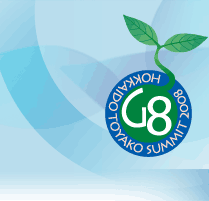
The 34th G8 summit was held in the town of Tōyako, Hokkaido, Japan, on July 7–9, 2008. The locations of previous summits hosted by Japan include Tokyo and Nago, Okinawa (2000). The G8 Summit has evolved beyond being a gathering of world political leaders to become an occasion for a wide variety of non-governmental organizations, activists and civic groups to congregate and discuss a multitude of issues.
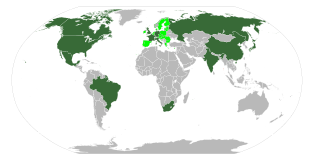
The Group of Eight + Five (G8+5) was an international group that consisted of the leaders of the heads of government from the G8 nations, plus the heads of government of the five leading emerging economies. In March 2014, Russia was cast out of the Group of 8 due to its involvement in the 2014 Crimea crisis in Ukraine, so the G8+5 in its original form is unlikely to reconvene with Russia present.
The Carnegie Group brings together the science ministers and senior officials from the G8 nations and some others including the European Commission in meetings, possibly every six months or every year. The location of meetings rotates from country to country.

The 35th G8 summit was held in L'Aquila, Abruzzo, Italy, on 8–10 July 2009. It was originally to be held at Sardinian seaside city of La Maddalena, but it was moved to L'Aquila as part of an attempt to redistribute disaster funds after the devastating earthquake that April.

The Partnership for Energy Efficiency Cooperation (IPEEC) is a high-level international forum which includes developed and developing countries. Its purpose is to enhance global cooperation in the field of energy efficiency and to facilitate policies that yield energy efficiency gains across all sectors globally. IPEEC provides information to decision-makers in major economies, facilitating candid discussions for exchanging ideas and experiences and helping countries undertake joint projects to develop and implement energy efficiency policies and measures at a global scale. It is also a forum for member and non-member economies to share information about various bilateral and multilateral initiatives. IPEEC supported initiatives are open to both member and non-member nations as well as the private sector. IPEEC is coordinating the implementation of the Group of 20 (G20) Energy Efficiency Action Plan, which was agreed by G20 leaders in late 2014 as a practical approach to strengthening voluntary international energy efficiency collaboration. Since July 2016, IPEEC is coordinating the Energy Efficiency Leading Programme (EELP) that provides the basis for a ‘comprehensive, flexible, and adequately-resourced’ framework for strengthened voluntary collaboration on energy efficiency among G20 members and beyond.
The G14 is a proposed plan that will add six emerging economies to the G8+5 group. Egypt will be part of the G14. The plan was announced in 2008 when France and Italy advocated for expansion.
GLOBE is the Global Legislators Organisation for a Balanced Environment, founded in 1991.

The OECD Development Centre was established in 1961 as an independent platform for knowledge sharing and policy dialogue between Organisation for Economic Co-operation and Development member countries and developing economies, allowing these countries to interact on an equal footing.













